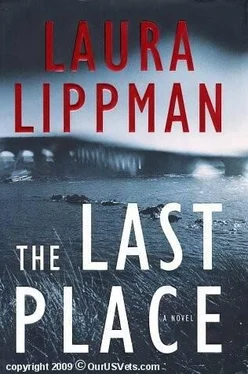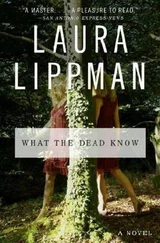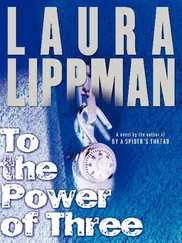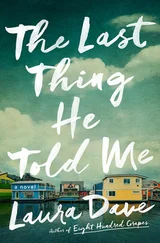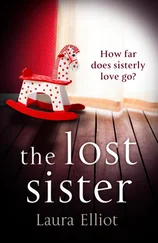“Her room number?” Tess asked.
“No, it’s the daily code.”
“Code?”
“To get out.” He gestured to the control pad by the double doors, which had locked behind them. “Our residents aren’t allowed to leave on their own.”
“Grim,” Whitney said.
The atmosphere only got grimmer as they took the elevator to the second floor. Their youth was an affront here, an obscenity. The women they passed in the halls-all women, nothing but women- looked up from their walkers and wheelchairs with undisguised envy. Tess heard a voice calling, weak and empty, a voice with no expectation of a reply.
“And this is the top of the line,” Whitney whispered. “Can you imagine what the bad ones are like?”
Luisa had a private room, which was little more than a glorified hospital room, although she had been allowed to add a few pieces of her own furniture-a chest, a small table, a flowery chintz chair that Tess remembered from the O’Neals’ sunroom. Luisa had sat in that chair when she explained to Tess just what she had done to keep her only son from facing criminal charges for the murder he had committed.
But she didn’t sit in her chair anymore. A large white-uniformed nurse overflowed in it, eyes fixed on the television in the corner. Redhaired and freckled, with olive skin, the nurse would have stumped any census taker who tried to guess her race. Luisa was in a hospital bed, propped up. A hand-lettered sign above the bed reminded the night staff that she was to wear cloth diapers, not plastic, because she was allergic to the plastic ones.
Tess had never thought anything could make her feel sorry for Luisa O’Neal, but that sign came close.
“Money not only can’t buy you love,” she said to Whitney, out of the side of her mouth, “it apparently can’t even guarantee you a dignified old age.”
Luisa’s pale blue eyes narrowed. She picked up a large sketch pad and a black marking pen.
I cannot speak,she wrote, but my hearing is fine.
“She’s such a liar,” said the nurse, one of those stoic, placid souls well suited to the profession. “She can talk, but she won’t, because she sounds funny, and she won’t do her therapy.”
Luisa turned to a fresh page. I do not like to do things if I cannot do them well.
“Big surprise,” Tess said. “But you could at least fill up a sheet of paper before starting on a new one. It’s wasteful, what you’re doing with that sketchbook.”
She shook her head, but it might have been a spasm. Then she wrote, Donna, would you leave us alone, please?The request clearly bothered the nurse, but she didn’t talk back. She heaved herself out of the chair, switched off the television, and marched out of the room. The nurse had a wonderful, insolent walk, her large backside swaying slowly back and forth.
“Do you know why we’re here, Luisa?” Whitney asked. They had decided Luisa might be more responsive to one of her own, another moneyed blueblood.
She hesitated. Tess knew she would lie to them if she thought she could get away with it. At last she wrote, I have my suppositions.
“You forwarded a list, through your foundation’s attorney, to a consortium of nonprofits interested in the issue of domestic violence.”
Luisa nodded.
“You decided which other nonprofits should be invited-and you made sure I was included. Your idea, your list, your project. My family’s board doesn’t have much experience with social issues. But you knew I’d jump at it, didn’t you? And you knew that Tess and I were old friends and I’d put her forward as the private investigator.”
Luisa had no response to any of this, no denial and no affirmation.
“In fact, it was your lawyer who suggested we hire a private detective. And it was your lawyer who said, ”Don’t you know someone like that, Whitney?“ ”
She wrote slowly, with more care than she needed. I cannot speak to things that happened when I was not there.
“Where did you get the list, Luisa?”
Research,she wrote. We have an excellent library here.
“Research?” Whitney had reached the limits of her patience- which, admittedly, was never a distant boundary. “With your palsied hands? If there’s a computer on the premises, it’s a cinch you don’t know how to use it.”
It was a great advantage, refusing to speak. Luisa simply stared at Whitney. The partial paralysis of her face made it particularly difficult to read. The stroke had left her with an Elvis-like sneer.
Tess turned to Whitney and mouthed, Leave. Whitney shook her head at first, but something in Tess’s face convinced her to go. She, too, stomped out to the hallway, shutting the door behind her.
Tess crouched by the bed, so she could speak as quietly as possible and still be heard. “Luisa. I kept your secret. It’s been over two years, and I’ve never told anyone how Seamon O’Neal arranged for Jonathan Ross to be killed.”
Her letters were not as careful now. I was never sure,she wrote, that he intended for him to die.The revisionism stunned Tess. Here was Luisa O’Neal on what appeared to be her deathbed, and she could not quite admit that anyone in her family was capable of wrongdoing.
“Why resist the truth, Luisa? Your husband is dead, beyond justice for the things he did, even if those things could be proven. Your son remains in the institution where you had him committed. The man who took credit for your son’s crimes has been executed for his own. No one mourns him, no one feels sorry for him. All your scores are settled, everyone you love is safe. Why can’t you afford me the same privilege?”
Luisa began to turn another page in her sketchbook but wrote instead at the bottom of the sullied page, I never wanted anything to do with you. I had hoped never to see you again. I am only a go-between.
“Whose?”
Still on the same page. I must not say.
“Why? What are you scared of?”
Quickly, fiercely, as if she were carving the words into Tess’s flesh:
Not death. I want to die.
“Great, good for you. You’re much braver than the rest of us. So what does this person have on you?”
Luisa placed her shaking hand on a silver frame at her bedside. A young woman, a woman who resembled the Luisa that Tess had once known, with luminous eyes and soft dark hair. She was with a handsome if beefy man and a chubby baby boy. The daughter, Tess recalled. Luisa had a daughter in Chicago.
Luisa wrote, He will kill her. I am sure of that.
Her own eyes were still beautiful, once you got past their withered casings, the faded brows and lashes. Deep in the damaged face, the eyes were as blue as ever, almost robin’s-egg blue. Tess remembered that Luisa Julia O’Neal had been known as Ellie Jay. She had been one of the city’s best female tennis players, strong and vigorous, albeit in a ladylike way. Now she was dying by inches. What disease had not taken from her, fear would. Fear was exacting a greater toll on her body now than all her medical problems.
“Luisa, I’ll do my best to protect you and your daughter. But I have to know something. If you won’t tell me who this man is, you must at least tell me what he wants.”
Luisa turned a page and wrote in large block letters that took the entire sheet:
You.
She should have been more shocked. But the moment the answer came, she realized she had known it all along. It was the gnat in the ear, the buzzing that had bothered her so many times. What did all these people have in common? Tess Monaghan.
Читать дальше
